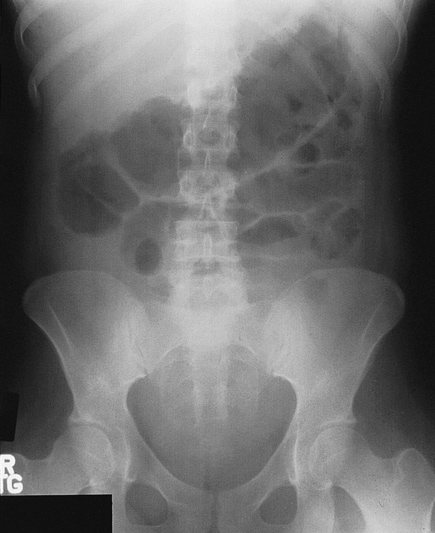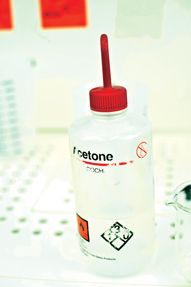MKSAP Quiz: ED evaluation for acute onset of pain
A 37-year-old woman is evaluated in the emergency department for the acute onset of pain after 2 weeks of bloody diarrhea. The diarrhea has escalated to 15 times per day. She has ulcerative colitis that was diagnosed 2 years ago. She currently takes azathioprine.
On physical examination, she appears ill. Following aggressive fluid resuscitation, temperature is 38.9°C (102.0°F), blood pressure is 70/40 mm Hg, pulse rate is 148/min, and respiration rate is 35/min. Abdominal examination discloses absent bowel sounds, distention, and diffuse marked tenderness with mild palpation.
Laboratory studies reveal a leukocyte count of 16,800/µL (16.8 × 109/L). Abdominal radiograph is shown.

Which of the following is the most appropriate management?
A. CT scan
B. Immediate surgery
C. Start infliximab
D. Start intravenous hydrocortisone
Answer and critique
The correct answer is B: Immediate surgery. This question can be found in MKSAP 16 in the Gastroenterology and Hepatology section, item 34.
The most appropriate management is immediate surgery. Most patients with toxic megacolon related to ulcerative colitis have at least 1 week of bloody diarrhea symptoms that are unresponsive to medical therapy. On examination, patients have tachycardia, fever, hypotension, decreased or absent bowel sounds, and lower abdominal distention and tenderness, often with peritoneal signs. On plain film radiography, the transverse colon is most affected, with dilatation exceeding 6 cm.
This patient has toxic megacolon based on the clinical history, examination findings and imaging studies. Toxic megacolon is the most severe complication associated with ulcerative colitis; it is associated with a 40% mortality rate in patients undergoing emergency colectomy after a perforation has occurred (compared with 2% without a perforation). About 50% of patients with toxic megacolon may improve with medical therapy (bowel rest, intravenous corticosteroids, antibiotics, and fluids); however, progressive abdominal distention and tenderness with hemodynamic instability are indications for immediate surgery.
A CT scan could further identify the extent of colonic dilatation and wall thickening as well as possible abscess formation or microperforation, but this would not change the required management of this patient.
Infliximab is a good treatment for flares of ulcerative colitis, but it is not an effective therapy for toxic megacolon and would not be indicated in this patient.
Intravenous hydrocortisone would be a good choice for an ulcerative colitis flare or possibly toxic megacolon, but only if the patient was clinically stable.
Key Point
- Toxic megacolon is the most severe complication associated with ulcerative colitis; progressive abdominal distention and tenderness with hemodynamic instability are indications for immediate surgery.



